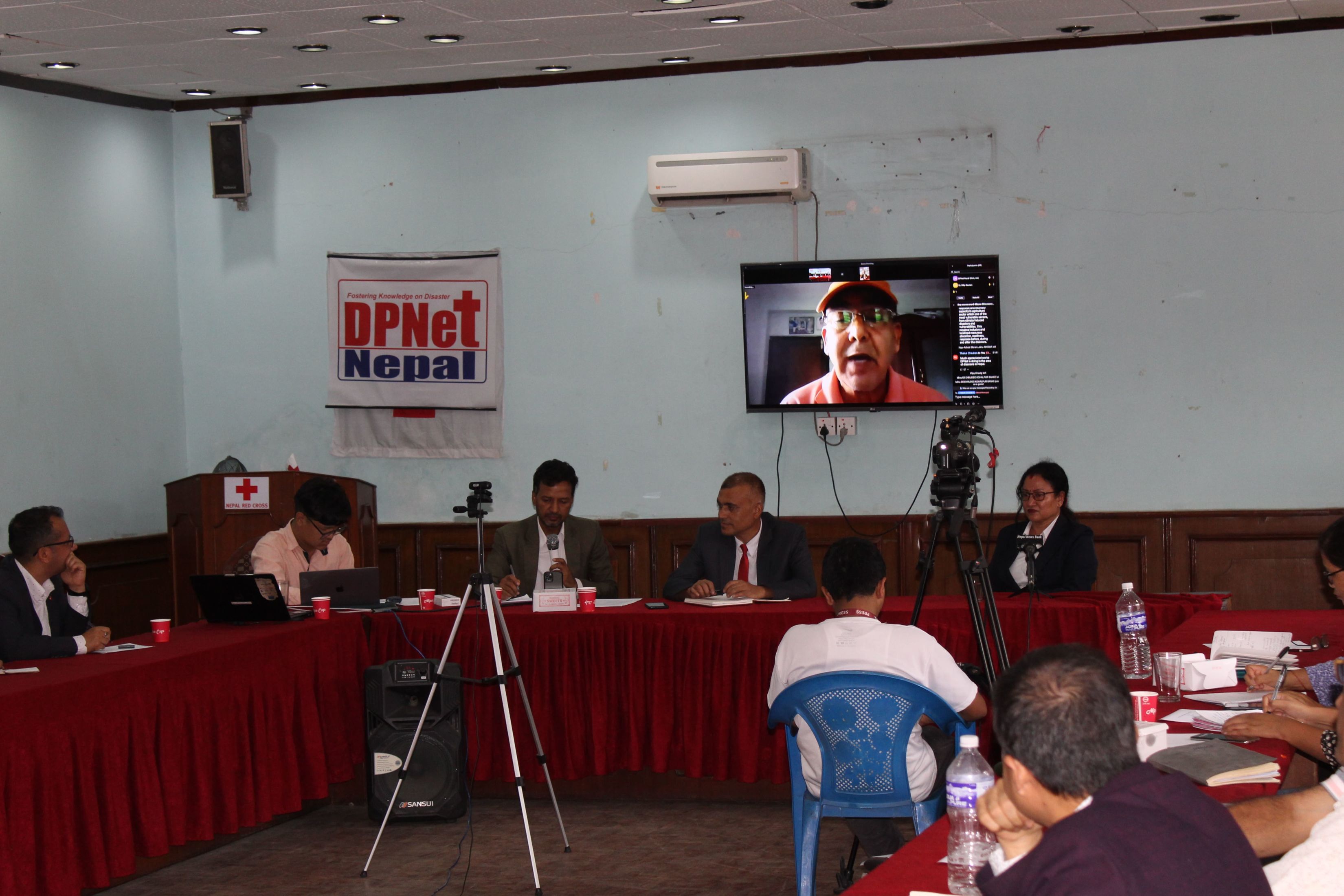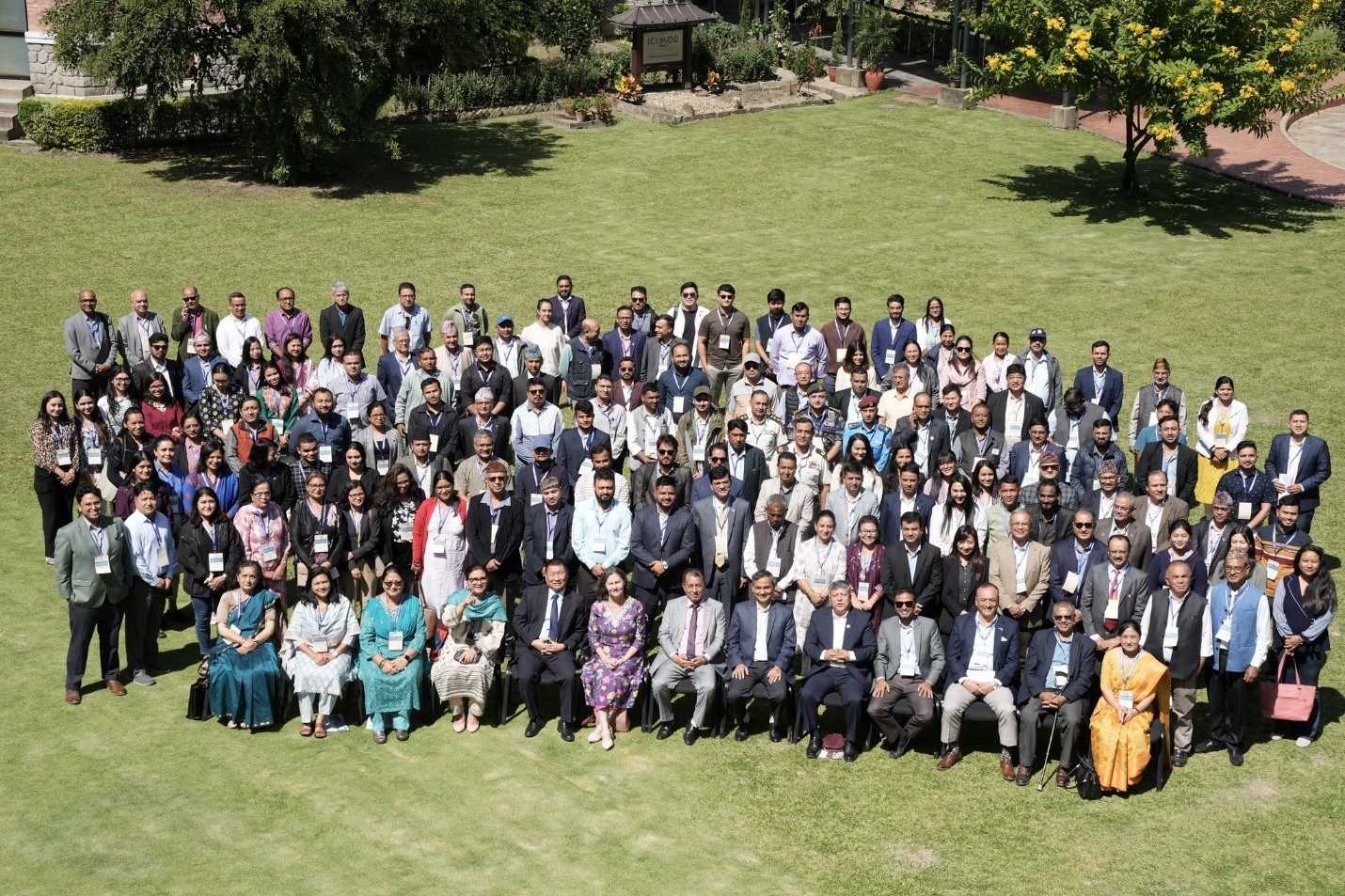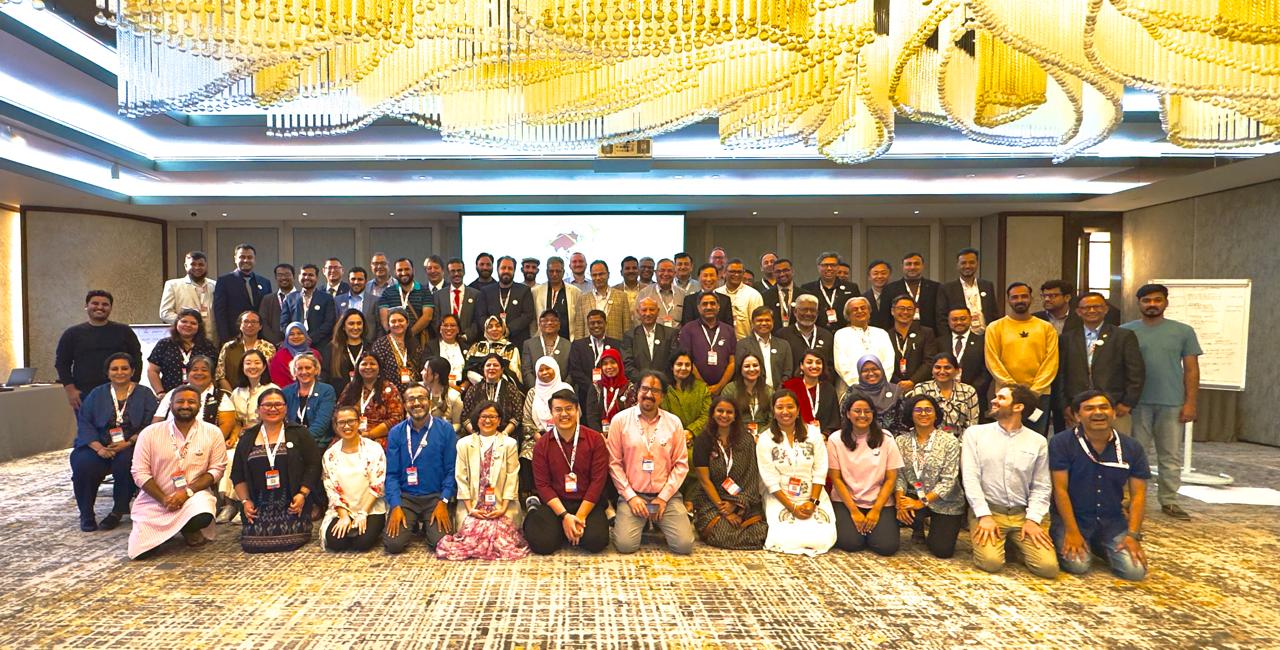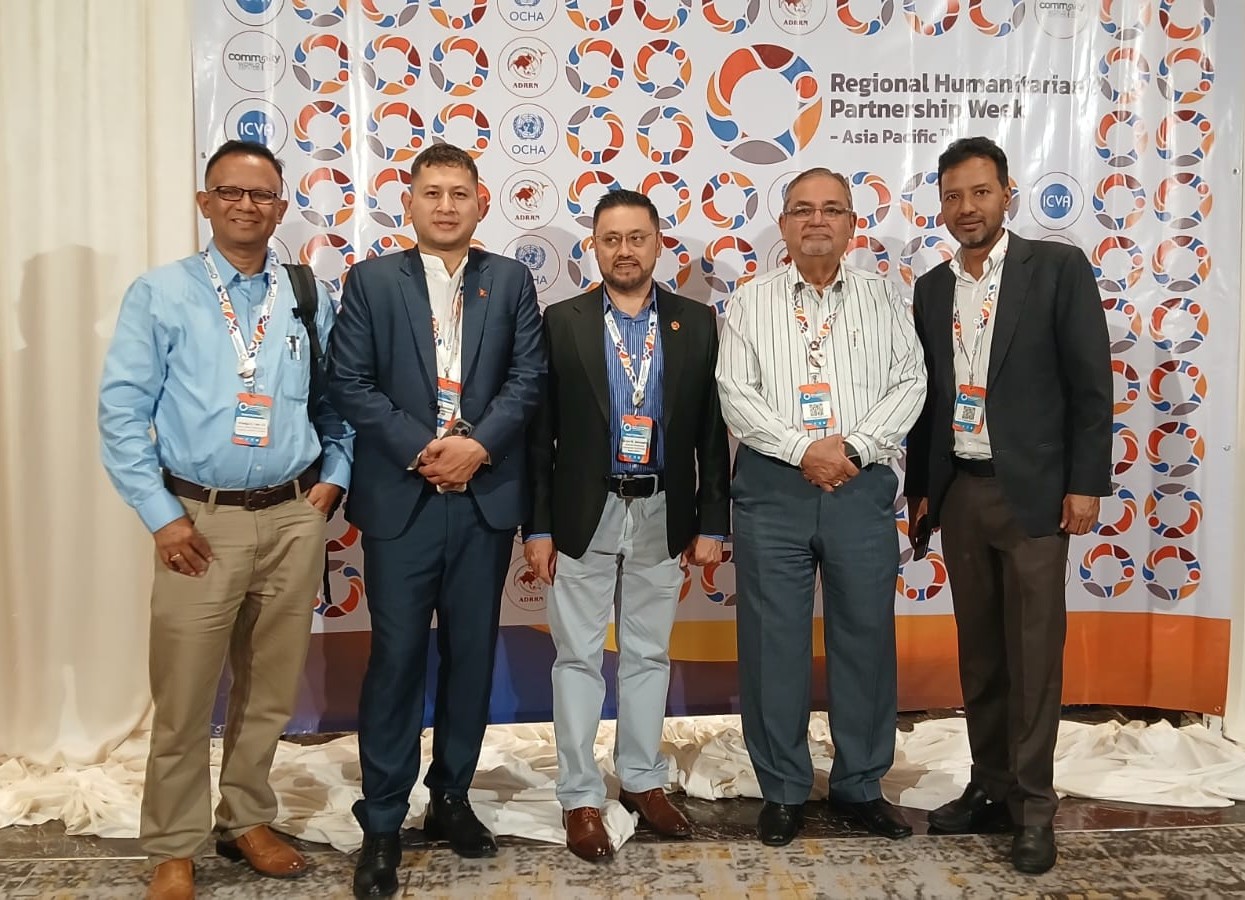Policy Dialogue on Disaster Risk Reduction Policies

On August 24, 2023, DPNet Nepal organized a significant discussion session focused on the hybrid model in Policy Dialogue on Disaster Risk Reduction policies. Dr. Raju Thapa, Acting Chair of DPNet Nepal, presided over the program, which featured a keynote presentation by Mr. Pradip Koirala, Joint Secretary of the Government of Nepal and Former Chief of the Disaster and Conflict Management Division at the Ministry of Home Affairs (MoHA). Distinguished guests in attendance included Mr. Tulsi Prasad Dahal, Chief of Disaster Study Risk Reduction and Recovery Section at MoHA, Mr. Santosh Gurung, Lieutenant Colonel of the Nepal Army, Mr. Dambar B.K, Senior Superintendent of Police in Nepal Police, Mr. Amit Singh, Deputy Superintendent of Police in APF, Mr. Rudra Adhikari, Joint Director at NRCS, Mr. Herve Gazeau, Program Coordinator with IFRC, Mr. Tirtha Raj Joshi, Deputy Chief of Party from USAID’s Tayar, in addition to representatives from UN agencies, NGOs, CSOs, and the private sector.
The keynote speaker, Mr. Pradip Koirala, initiated his presentation by emphasizing the significance of laws, acts, and policies tailored to benefit the general populace at the grassroots level. In addition, he emphasized the need to prioritize farmers' inclusion in policy discussions, asserting that 50% representation of farmers in such debates is paramount. He underscored that decision-makers must have a clear understanding of perspectives and decisions to avoid potential misinterpretations that could lead to disastrous outcomes. Bridging the gap between planning and reality, he asserted, hinges on comprehensive understanding.
Mr. Koirala raised questions about potential disparities between the Sendai Framework for Disaster Risk Reduction (SFDRR) and our interpretation of it. He highlighted the prevalent focus on the monsoon season rather than adopting a year-round approach. He also critiqued the tendency to concentrate solely on establishing a single institution for Disaster Risk Governance, asserting that governance across all sectors is vital. He expressed concerns that investments in DRR were confined to foreign investment expansion, and he called for a shift towards focusing on capacity building, reliability, and collaboration with the government for effective disaster response.
In lieu of pursuing new policies, Mr. Koirala advocated for leveraging the advantages of existing ones. He shared that the National Planning Commission has begun recognizing the importance of policy discussions. He stressed that megastructures should be constructed with disaster sensitivity integrated into development. However, he acknowledged the confusion among various government agencies regarding development impacts, building code implementation, and urban fire control.
Reflecting on his experience at the MoHA and assessing five years of implementing the DRM Act, Mr. Koirala revealed that only 10% of the necessary work on DRR has been accomplished, with 90% remaining. He mentioned that over two dozen policies introduced by the DRR Executive Committee haven't been effective in practice, and many ministries hesitate to take ownership of them. The ministries argue that these policies should be passed through the ministerial cabinet. Yet, when these policies are presented to the cabinet, the responsibility is deflected back to the executive committee. This cyclic game has created a policy limbo in disaster risk reduction and management, leaving many initiatives in a standstill. He pointed out that ministries function under their respective acts, sometimes conflicting with the DRRM Act.
Furthermore, Mr. Koirala emphasized that the role of the National Disaster Risk Reduction and Management Authority (NDRRMA) mirrors that of the National Emergency Operation Center (NEOC), leading to role and responsibility duplications among agencies such as data portals, emergency operation centers, and stockpiles. He advocated for reevaluating the existing governance system. He proposed that there should be a dedicated Ministry like in Japan under Prime Minister Officer to look after disaster which can ensure quality of development work from the disaster management perspective as well.
Open Discussion Session:
Mr. Sunil Sun Shakya pointed out the existing gap between policies and effective implementation, urging a shift towards resilience-building across sectors rather than relying solely on relief efforts.
Mr. Shyam Sundar Jnavaly emphasized a pragmatic approach, prioritizing actions over policies. He suggested aligning policy formulation with actionable plans and questioned the current duplication of agencies, advocating for streamlined governance and policy coherence.
Ms. Chadani Joshi praised the initiative's coordination efforts while underscoring the need for better inter-agency communication. Stressing the importance of resilience in all sectors, she affirmed that DRR offers a comprehensive solution.
Mr. Pramod Lamichhane drew attention to the pivotal role of quality infrastructure in DRR. He cited examples from countries like Japan, emphasizing the significance of robust construction practices and technology adoption. He also urged proper land use planning and highlighted the need for skilled labor in construction projects.
Mr. Govinda Rimal highlighted the importance of community-level awareness and criticized the current weak implementation and monitoring mechanisms. He emphasized that DRR should be integral to the national building code and woven into all policies.
Mr. Kedar Neupane underscored the ongoing transitional phase and the need to integrate DRR within government structures. He stressed the importance of a well-defined NDRRMA with a clear structure, budget, and team. He urged cohesive policy and implementation strategies across government levels.
Ms. Manisha Dhakal called for LGBTQI inclusion in DRR policies and sensitive accountability for inclusive DRR. She recommended increasing open spaces for safety.
Mr. Bishnu Kharel emphasized documenting best practices, researching DRR effectiveness, and unbiased evaluations of NDRRMA and MoHA's functions.
Mr. Bishnu Prasad Timilsina called for reviews of DRR policies and increased governmental commitment. He emphasized that the development of laws is an evolutionary process rather than a revolutionary one, and they should be regularly reviewed to address gaps and needs.
Mr. Chabbi Paudel stressed the connection between DRR and agriculture and advocated for integrated policy implementation.
Mr. Ram Prasad Rimal stressed the importance of policies taking into account technological aspects in addition to community-level and individual-level concerns, rather than solely focusing on administrative aspects.
Mr. Kedar Babu Dhungana highlighted the need for addressing fire and other potential hazards. He suggested that the government should classify priority areas, and development partners should contribute to these government-classified priority areas. He also emphasized the importance of establishing and mobilizing a common forum to collaboratively achieve goals in DRR.
Mr. Santosh Gurung emphasized the importance of aid and financial support in DRR while also highlighting the need to take into account national security interests.
Mr. Santosh Sharma underscored the necessity of integrating DRR considerations effectively into development initiatives to ensure sustainable progress. He highlighted the government's pivotal role in DRR, while also emphasizing the importance of collaboration among various agencies to achieve a comprehensive and effective approach to disaster risk reduction.
Mr. Kailash Rijal highlighted the need for localized research and documentation. He also emphasized the proper collaboration and communication between inter-ministry among governments for effective DRR.
Mr. Ram Krishna Bhandari emphasized the importance of awareness and preparedness to reduce the impacts of monsoons and potential hazards.
Mr. Dambar BK called for analyzing policy-implementation gaps and providing localized DRR materials. He noted a lack of shared understanding hindering policy execution.
Mr. Amit Singh highlighted the importance of addressing policy gaps rather than developing new legal frameworks for effective DRR.
Ms. Amika Rajthala highlighted prioritizing infrastructure safety for sustainable DRR within the country.
Dr. Dilip Kumar Gautam acknowledged challenges in understanding and implementing DRR policies, suggesting placing NDRRMA under the Prime Minister's Office for stronger coordination. He called for focused agency roles to minimize duplication.
Mr. Tulsi Prasad Dahal emphasized the importance of distinguishing between policies and programs in DRR. He stressed the necessity of enhancing the capacity of each sector involved in DRR. According to Mr. Dahal, the MoHA is currently undertaking a policy audit, a pivotal stride toward effectively implementing DRR-related regulations and policies. He assured that MoHA is committed to integrating the feedback received from the discussions into their efforts.
Addressing suggestions and quarries from floor Mr. Pradip Koirala emphasizes the importance of DRRM practitioners advocating for our nation's concerns, prioritizing domestic matters over international ones. Mr. Koirala emphasizes the need for a clear distinction between micro and macro perspectives to facilitate the effective identification of issues. He advocates for streamlining organizational efforts to minimize duplication and assigning functional and policy-level responsibilities to distinct entities. Highlighting the practicality of policies and their implementation, Mr. Koirala emphasizes the necessity for periodic revisions when necessary. He underscores the significance of discerning between functional and policy-related aspects and undertaking appropriate actions for each. Recognizing the complexity of the task, he suggests that a single agency may not be equipped to manage all aspects effectively. To this end, he proposes a division of roles, with the Prime Minister's Office overseeing policy matters and the Ministry of Home Affairs taking charge of implementation.
Closing speech
Dr. Raju Thapa highlighted several critical areas for advancing DRR efforts. He stressed the importance of fostering resilience across various sectors, aligning policies with practical actions, and enhancing communication among different agencies. He emphasized the integration of DRR principles into policies, followed by effective policy implementation through dedicated budget allocation and cohesive strategies. Inclusivity in policies, the need for hazard accountability, and the creation of open spaces were also focal points in his recommendations. Dr. Thapa emphasized the shared responsibility of stakeholders in ensuring robust DRR practices in Nepal. Furthermore, he underscored the significance of documenting best practices, conducting research, and carrying out unbiased evaluations. These measures would be instrumental in addressing gaps in policies, ensuring infrastructure safety, promoting localized research, raising awareness, and bridging understanding gaps.
In the closing remarks Dr. Thapa highlighted the importance of organizing such policy dialogue emphasizing the urgent need to address this matter promptly, especially considering current position at the midterm review of the Sendai Framework. He expressed his appreciation to all participants and recognized the Red Cross for their efficient logistical management and provision of the venue. With these remarks, he concluded the program.











